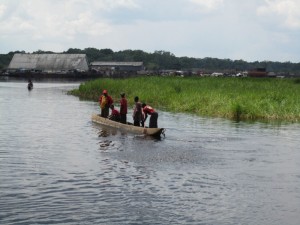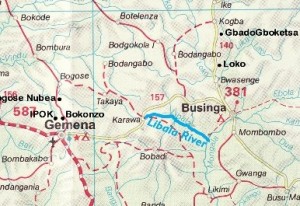
Many Congolese use the rivers like highways to transport goods and sell at port cities if the rivers are passable.
Some things seem impossible. Gbagu (pronounced Ba-goo) does not understand impossible.
Gbagu owns a big boat, one that can transport up to 12 tons of goods. In northwestern DR Congo, where roads are typically impassable, rivers are highways. Think of a semi traveling down your local interstate.
The reclamation of his boat is noteworthy, “The boat is yours, if you can find it,” the story goes. The boat was on the bottom of a river, where the boat’s former owner had left it. Gbagu managed to resurrect the boat, fix it up, and start a business.
Why is this critical? Because the local river, like so many in NW Congo, is impassable. But if the Libala River became navigable all the way to Karawa, the town’s isolated market would have new life. This means clearing an 80 kilometer (49 miles) stretch of the Libala River to connect the city of Karawa, with the country’s primary river system. After talking with the leaders of the communities along the Libala River, Gbagu began clearing debris from the river—rocks, trees, stumps, etc. With essentially no outside support, he cleared 50 km (31 miles) of river through some of the world’s densest jungle. Today people are already using the portion of the river he has cleared. The primary beneficiaries of his work are the rural farmers looking to sell their produce.

The Libala River is 80 km (40 miles) that connects Gbagu’s home town, Karawa, with the country’s primary river system.
Gbagu wants to finish what he has started but the trees on the remaining segment of river are simply too big for axes and small saws. So Gbagu submitted a business application to PCP noting his need for a large chainsaw and a new welder. Through this small business investment, the Libala River will be opened for the first time in history due to the persistent entrepreneurialism of Gbagu. In addition to his own personal business, 50,000 people who rely on this market for provisions and income, will benefit from this business endeavor. Gbagu stands to grow his business in a great way, and he’s eager to see other people using the river as well, “My main objective is to open this possibility for people to get their produce out of Karawa at an affordable price, to other parts of the Province and even Kinshasa.”
The floodgates are about to open along the Libala River. Karawa is about to become a port city for the first time. All as a result of Gbagu’s ingenuity and perseverance.
PCP (Paul Carlson Partnership) is proud to partner with local business entrepreneurs such as Gbagu.
Wondering how can you help?
- Pray for supplies: That the materials he needs will be provided soon and safely.
- Pray for Gbagu: That he will safely be able to clear the river.
- Pray for the communities: That they will experience economic growth through this endeavor.
- Give: Donate to PCP so we can continue to support local entrepeneurs in Congo.
(This story is adapted from the most recent PCP newsletter. See Paul Carlson Partnership for more information.)

Wow! What a project Gbagu. I did not know that the Libala went all the way through to the Mongala river.
Report This Comment